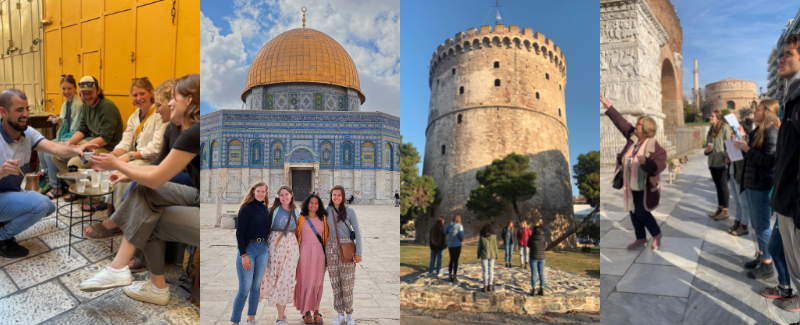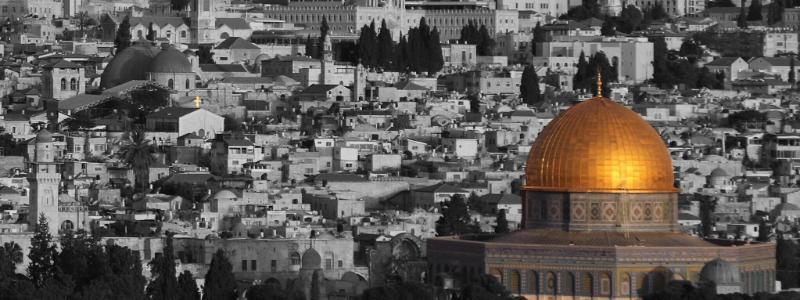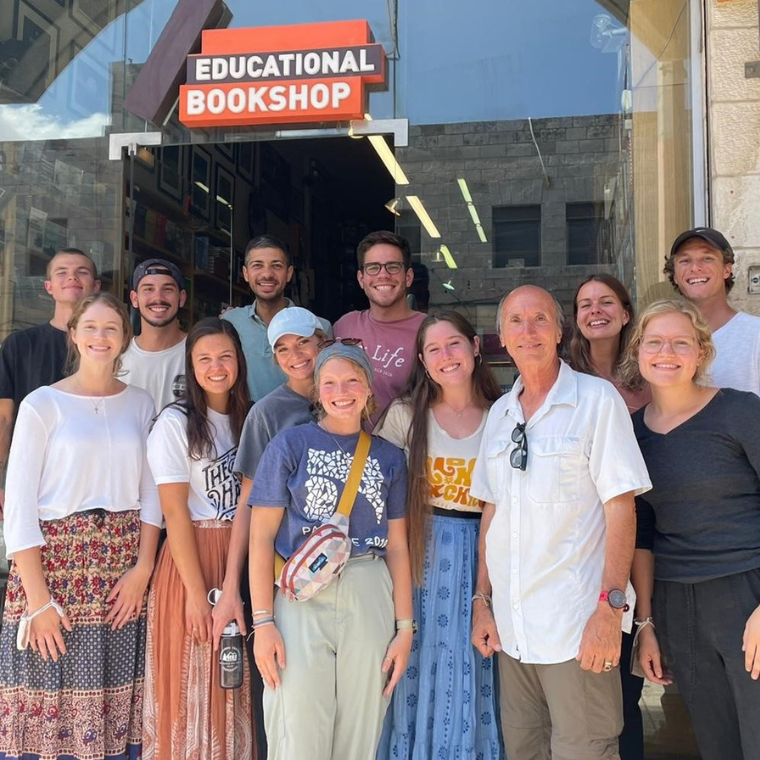Semester in Jerusalem
Engage With Ancient and Modern Narratives
A Wheaton College faculty-led semester program where students study and engage with ancient Biblical and modern Middle East narratives.

The program is:
- Inter-disciplinary—course credits can be applied to various majors/minors and fulfill thematic tags
- Experiential—courses include on-site field studies and excursions
- Cross cultural—meaningful engagement with local individuals and communities
- Formative—gain a deeper understanding of the beauty and complexity in the region
Location
Students reside and study at Jerusalem University College in Jerusalem, the cradle of ancient civilizations and one of the most vibrant cultural and religious communities in the world. Jerusalem has played a major role in world events for centuries—it is a city of religious and political significance. The JUC campus is nestled atop Mount Zion next to the Old City. In addition to classroom work at JUC, the program includes field studies to historical, cultural, religious, and political sites throughout Israel and (travel permitting) the West Bank territories and into Jordan.
After completing studies at JUC and if there are no travel restrictions, students conclude the program in a location with a complementary environment such as Prague, Czech Republic for the group to synthesize the semester of study and expand topics and studies of the CORE course.
Living Arrangements
With the exception of hotels and other accommodations during overnight excursions and the program extension, students live in dorm rooms at Jerusalem University College.
Requirements and Prerequisites
Students must be undergraduates in good academic and judicial standing and have at least a 2.5 GPA to participate. All program participants must complete GPS 231: Orientation to Study Abroad (2 hrs.) offered during B quad of the semester prior to the program. It is recommended (but not required) that students complete either BITH 211: OT Literature and Interpretation or BITH 213: NT Literature and Interpretation prior to the program.
Courses
Students earn 14-17 credit hours during the program. Many courses are accepted for major or minor elective credit by the related academic department(s) and some fulfill CATC thematic core tags. Courses at Jerusalem University College are taught by noted Israeli and Palestinian professors who are experts in their fields. Students also take a four-credit CORE course taught by the Wheaton College professor in residence.
Students complete the following required courses:
- GPS 306: Physical Settings of the Bible (4 credit hrs.) HP
A study of the physical features of the land of the Bible with an emphasis on the geographical elements of various regions and how geography influenced and affected aspects of biblical and extra-biblical history. Relevant archaeological, historical and biblical material is integrated into the lectures and field studies where it is correlated with the sites visited, the ancient network of roads and geographical elements of the land. - CORE 367: The Holocaust and the Holy Land: A Literary Exploration (4 credit hrs.) AIS/GP/LE
This course offers a comprehensive, interdisciplinary exploration of the complex interplay between the
Holocaust and the establishment of the modern State of Israel. We will analyze the historical, cultural, and
moral implications of these two interconnected narratives and seek to foster a deeper understanding of the
events that have shaped contemporary Jewish identity and the broader geopolitical landscape—a landscape
that has been profoundly affected by the Holocaust, or Shoah.
Students choose two to three electives from the following anticipated courses:
- GPS 318: Biblical Archaeology I (3 credit hrs.)
A survey of the results of archaeological investigations in the land of the Bible from proto-historical periods to the end of the Judean Monarchy. Emphasis is placed on relating archaeological finds to historical records, including the Old Testament. - GPS 311: History of Ancient Israel (3 credit hrs.)
An overview of the historical background of the Hebrew Bible/Old Testament. The focus is on the history of the land and the people of ancient Israel from their origin through the end of the Iron Age as seen within their Near Eastern environment. The course will use a combination of biblical, archaeological and historical data, emphasizing the distinct methodologies used in the study of each. - GPS 308: History of the Church in the East (3 credit hrs.)
An introduction to the history of the Christian Churches in the Middle East from the first to the seventh centuries A.D. Major Christian authors from the Second Temple to Constantine will show the common Christian basis of the churches in the Middle East, while representative Church writers from the three developing ecclesial families (Assyrian, Oriental, Chalcedonian) will reflect each Church’s significant role in the Christian mosaic in the Middle East. - GPS 312: Qumran and the Dead Sea Scrolls (3 credit hrs.)
A study of the texts and major critical issues concerning the Qumran community and the Dead Sea Scrolls, including their origin, interpretation of the Old Testament and place within the Jewish world and early Christianity. - GPS 313: History of the Jews during the Medieval and Modern Periods (3 credit hrs.)
An examination of Jewish history from the rise of Christian Europe in the fifth century AD to the present, by addressing such topics as medieval Jewish communities in Babylonia, Spain, Germany and Poland; Jewish relations with the church and crown; Jewish communal structure; modern changes such as enlightenment and emancipation; new Jewish movements and ideologies; modern anti-Semitism and the Holocaust; and Zionism and the rise of the modern state of Israel. - GPS 403: Iconographic Art in Judaism and Early Christianity (3 credit hrs.)* VPAV
A study of the art of Judaism and early Christianity in the centuries following the Second Temple period that expresses biblical and theological themes. *Course offering is subject to instructor availability and sufficient enrollment. - GPS XXX: Life and Times of Paul** (3 credit hrs.)
A narrative study of the life of Paul in Acts in light of historical, cultural and geographical backgrounds with application to Christian faith, practice, and witness. **Pending approval at Wheaton College. - GPS 316: Introduction to the Modern Middle East (3 credit hrs.)
A study of key political, cultural, and social aspects of the Middle East from the 19th century to the present, addressing topics such as Arab nationalism, Islamic fundamentalism, and Zionism. - GPS 317: Palestinian Society and Politics (3 credit hrs.) SI
A study of the socio-economic, organizational and political components of Palestinian society, with a focus on pertinent current developments. - GPS 401: Readings in Biblical Hebrew: Historical and Geographical Texts*** (3 credit hrs.)
A literary, textual and exegetical study of biblical Hebrew narrative texts that are significant for the study of historical geography. This course seeks to integrate the physical reality of the land of the Bible with the Hebrew text of the Old Testament. *** HEBR102 is a pre-requisite for this course.
Anticipated Major/Minor Elective Credits for Courses (beginning with the 2023-24 catalog*)
- GPS 306: Physical Settings of the Bible: ANTH, ARCH, BITH, GEOL
- GPS 318: Biblical Archaeology I: ARCH
- GPS 311: History of Ancient Israel: ARCH, BITH
- GPS 308: History of the Church in the East: BITH, HIST
- GPS 312: Qumran and the Dead Sea Scrolls: BITH
- GPS 313: History of the Jews during the Medieval and Modern Periods: IR/PACS, HIST
- GPS 403: Iconographic Art in Judaism and Early Christianity: ART
- GPS XXX: Life and Times of Paul: BITH (Pending review/approval at Wheaton College)
- GPS 316: Introduction to the Modern Middle East: IR/PACS
- GPS 317: Palestinian Society and Politics: ANTH, IR/PACS
- GPS 401: Readings in Biblical Hebrew - Historical and Geographical Texts: BITH
ANTH majors/minors may earn up to 6 elective credits. Physical Settings fulfills the archaeology requirement for the Anthropology major. Palestinian Society and Politics can be applied towards the Anthropology major with department permission.
Physical Settings, Biblical Archaeology I, or History of Ancient Israel can count toward fulfilling the 6-hours of the elective block in the Archaeology major. Up to six hours can be drawn from History of the Church in the East, Qumran and the Dead Sea Scrolls, or Readings in Biblical Hebrew to count toward the interdisciplinary emphasis portion of the Archaeology major.
BITH majors/minors may earn up to 9 elective credits. Physical Settings of the Bible or Biblical Archeology I count toward the archaeology requirement; History of the Church in the East counts toward the theology requirement.
IR/PSCI majors/minors and those completing the PACS Certificate Program may earn 6 elective credits by taking Intro to the Modern Middle East or Palestinian Society and Politics. In addition, History of the Jews during the Medieval and Modern Periods can fulfill the history elective requirement for the IR major.
History courses may be applied towards the History major/minor only with department approval.
*Students under a catalog year prior to the 2023-24 undergraduate catalog should use the above chart as a guide; for those students, some courses do not automatically count toward a major or minor. Students may seek approval through the departmental recommendation process (documentation should be on file prior to the start of the program).
Anticipated Semester Dates*
**The Semester in Jerusalem program is currently suspended.**
Cost
Program costs are comparable to a full-time on-campus semester at Wheaton (full semester tuition and a program fee equivalent to on-campus housing and food costs) and cover program tuition, room and board, academic excursions, and transportation within the program (surface and air). This does not cover passport or visa fees (if more than the standard fee), airfare to/from from the program, vaccinations or pre-program medical tests, field study fees for some elective courses (see course descriptions above for courses with additional field study fees), textbooks, and other personal expenses.
A $500 non-refundable deposit is collected after acceptance to the program and applied toward the program tuition fee. Financial aid is available for the program on the same basis as that of an on-campus semester when CPOS requirements are met.
Faculty Leader
Dr. Dyanne Martin, Assistant Professor of English and Education
 I am delighted by the opportunity to share this semester study experience with students, building community as we traverse the region and learn more about the beauty, complexities, and challenges of the Middle East.
I am delighted by the opportunity to share this semester study experience with students, building community as we traverse the region and learn more about the beauty, complexities, and challenges of the Middle East.
I hold a dual appointment as an assistant professor of both English and Education at Wheaton College, where I teach a wide variety of classes, including two courses that focus on literature of the Holocaust. My PhD is in Cultures, Languages, and Literatures, so I am especially excited for us to be immersed in a country so richly endowed in each of those areas. I am also a research fellow for the Institute for the Study of Global Antisemitism and Policy (ISGAP), and my work there allows me to engage in research, writing, and teaching that all focus not only on the Middle East, but also on how geopolitical events in the area affect North America and the United Kingdom.
My deep interest in other cultures stems from my childhood in Jamaica, where growing up amid numerous ethnicities (and admixtures thereof) piqued my fascination with cultural identity as formed within unified syncretic communities. I currently live near Wheaton with my fabulous, beloved husband, Tom, who is the Clyde S. Kilby Endowed Chair of English at Wheaton College. We both love transformative literature, old movies, inspiring music, excellent food, and global travel.
Learn More
If you have questions or would like to know more about the Semester in Jerusalem program, contact us at Semester.in.Jerusalem@wheaton.edu.
How to Apply
To apply, visit GoGlobal, Wheaton College's registration system for off-campus study and international travel, research, and internships.

